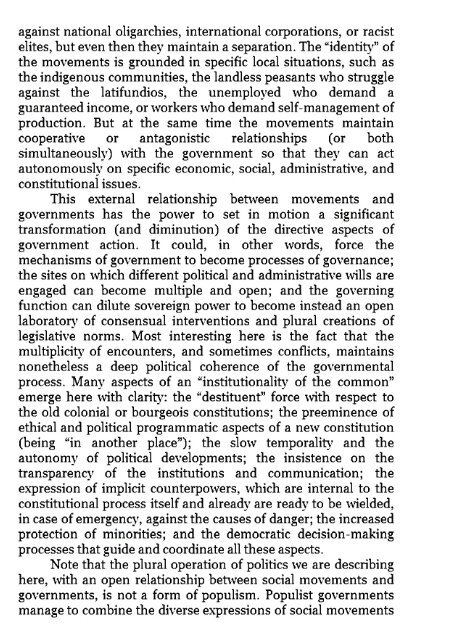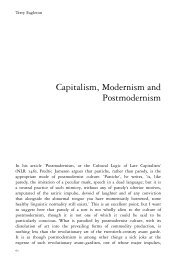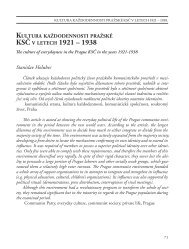Chapter 1: Subjective Figures of the Crisis ... - Negri in English
Chapter 1: Subjective Figures of the Crisis ... - Negri in English
Chapter 1: Subjective Figures of the Crisis ... - Negri in English
You also want an ePaper? Increase the reach of your titles
YUMPU automatically turns print PDFs into web optimized ePapers that Google loves.
aga<strong>in</strong>st national oligarchies, <strong>in</strong>ternational corporations, or racist<br />
elites, but even <strong>the</strong>n <strong>the</strong>y ma<strong>in</strong>ta<strong>in</strong> a separation. The "identity" <strong>of</strong><br />
<strong>the</strong> movements is grounded <strong>in</strong> specific local situations, such as<br />
<strong>the</strong> <strong>in</strong>digenous communities, <strong>the</strong> landless peasants who struggle<br />
aga<strong>in</strong>st <strong>the</strong> latifundios, <strong>the</strong> unemployed who demand a<br />
guaranteed <strong>in</strong>come, or workers who demand self-management <strong>of</strong><br />
production. But at <strong>the</strong> same time <strong>the</strong> movements ma<strong>in</strong>ta<strong>in</strong><br />
cooperative or antagonistic relationships (or both<br />
simultaneously) with <strong>the</strong> government so that <strong>the</strong>y can act<br />
autonomously on specific economic, social, adm<strong>in</strong>istrative, and<br />
constitutional issues.<br />
This external relationship between movements and<br />
governments has <strong>the</strong> power to set <strong>in</strong> motion a significant<br />
transformation (and dim<strong>in</strong>ution) <strong>of</strong> <strong>the</strong> directive aspects <strong>of</strong><br />
government action. It could, <strong>in</strong> o<strong>the</strong>r words, force <strong>the</strong><br />
mechanisms <strong>of</strong> government to become processes <strong>of</strong> governance;<br />
<strong>the</strong> sites on which different political and adm<strong>in</strong>istrative wills are<br />
engaged can become multiple and open; and <strong>the</strong> govern<strong>in</strong>g<br />
function can dilute sovereign power to become <strong>in</strong>stead an open<br />
laboratory <strong>of</strong> consensual <strong>in</strong>terventions and plural creations <strong>of</strong><br />
legislative norms. Most <strong>in</strong>terest<strong>in</strong>g here is <strong>the</strong> fact that <strong>the</strong><br />
multiplicity <strong>of</strong> encounters, and sometimes conflicts, ma<strong>in</strong>ta<strong>in</strong>s<br />
none<strong>the</strong>less a deep political coherence <strong>of</strong> <strong>the</strong> governmental<br />
process. Many aspects <strong>of</strong> an "<strong>in</strong>stitutionality <strong>of</strong> <strong>the</strong> common"<br />
emerge here with clarity: <strong>the</strong> "destituent" force with respect to<br />
<strong>the</strong> old colonial or bourgeois constitutions; <strong>the</strong> preem<strong>in</strong>ence <strong>of</strong><br />
ethical and political programmatic aspects <strong>of</strong> a new constitution<br />
(be<strong>in</strong>g "<strong>in</strong> ano<strong>the</strong>r place"); <strong>the</strong> slow temporality and <strong>the</strong><br />
autonomy <strong>of</strong> political developments; <strong>the</strong> <strong>in</strong>sistence on <strong>the</strong><br />
transparency <strong>of</strong> <strong>the</strong> <strong>in</strong>stitutions and communication; <strong>the</strong><br />
expression <strong>of</strong> implicit counterpowers, which are <strong>in</strong>ternal to <strong>the</strong><br />
constitutional process itself and already are ready to be wielded,<br />
<strong>in</strong> case <strong>of</strong> emergency, aga<strong>in</strong>st <strong>the</strong> causes <strong>of</strong> danger; <strong>the</strong> <strong>in</strong>creased<br />
protection <strong>of</strong> m<strong>in</strong>orities; and <strong>the</strong> democratic decision-mak<strong>in</strong>g<br />
processes that guide and coord<strong>in</strong>ate all <strong>the</strong>se aspects.<br />
Note that <strong>the</strong> plural operation <strong>of</strong> politics we are describ<strong>in</strong>g<br />
here, with an open relationship between social movements and<br />
governments, is not a form <strong>of</strong> populism. Populist governments<br />
manage to comb<strong>in</strong>e <strong>the</strong> diverse expressions <strong>of</strong> social movements










